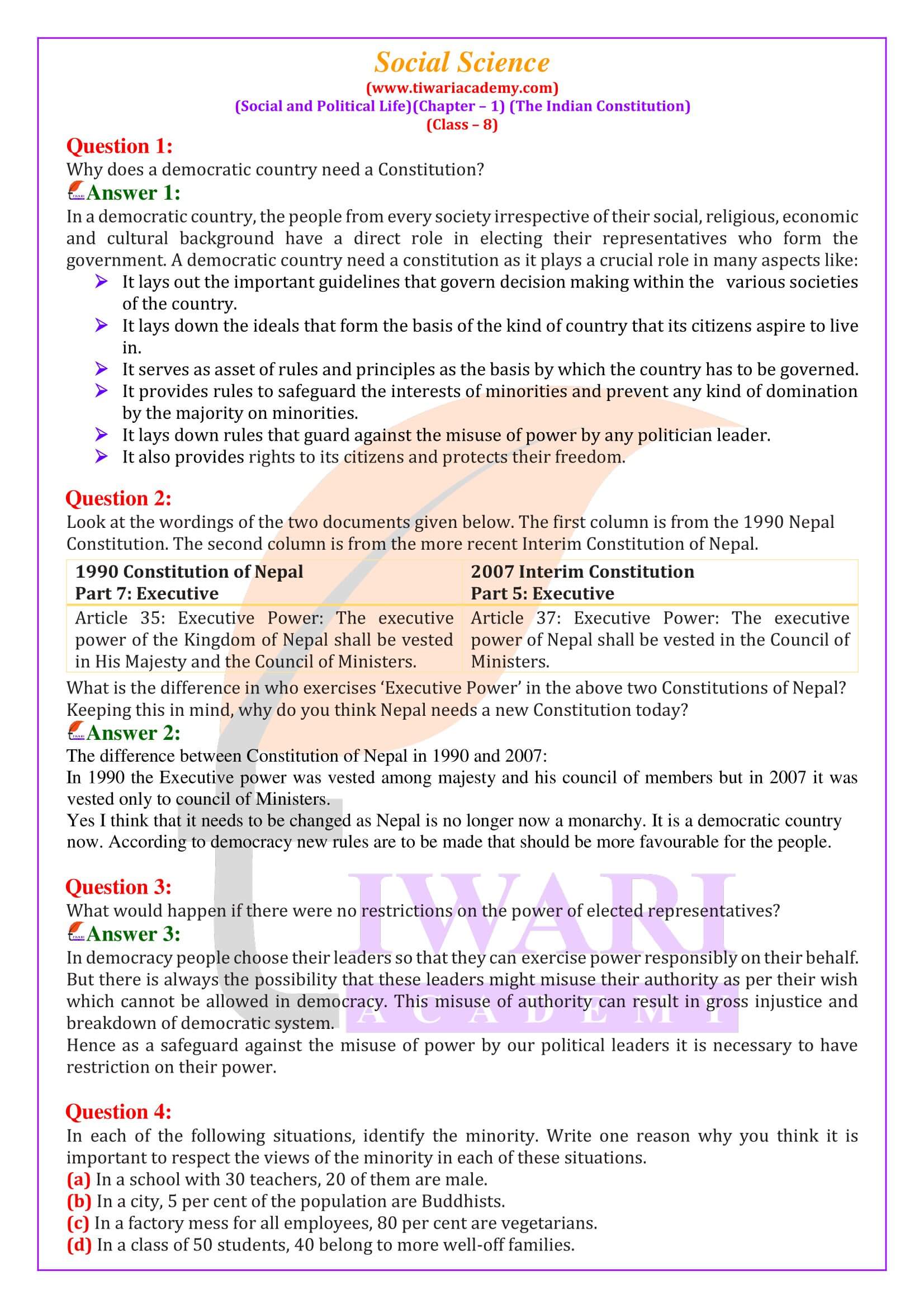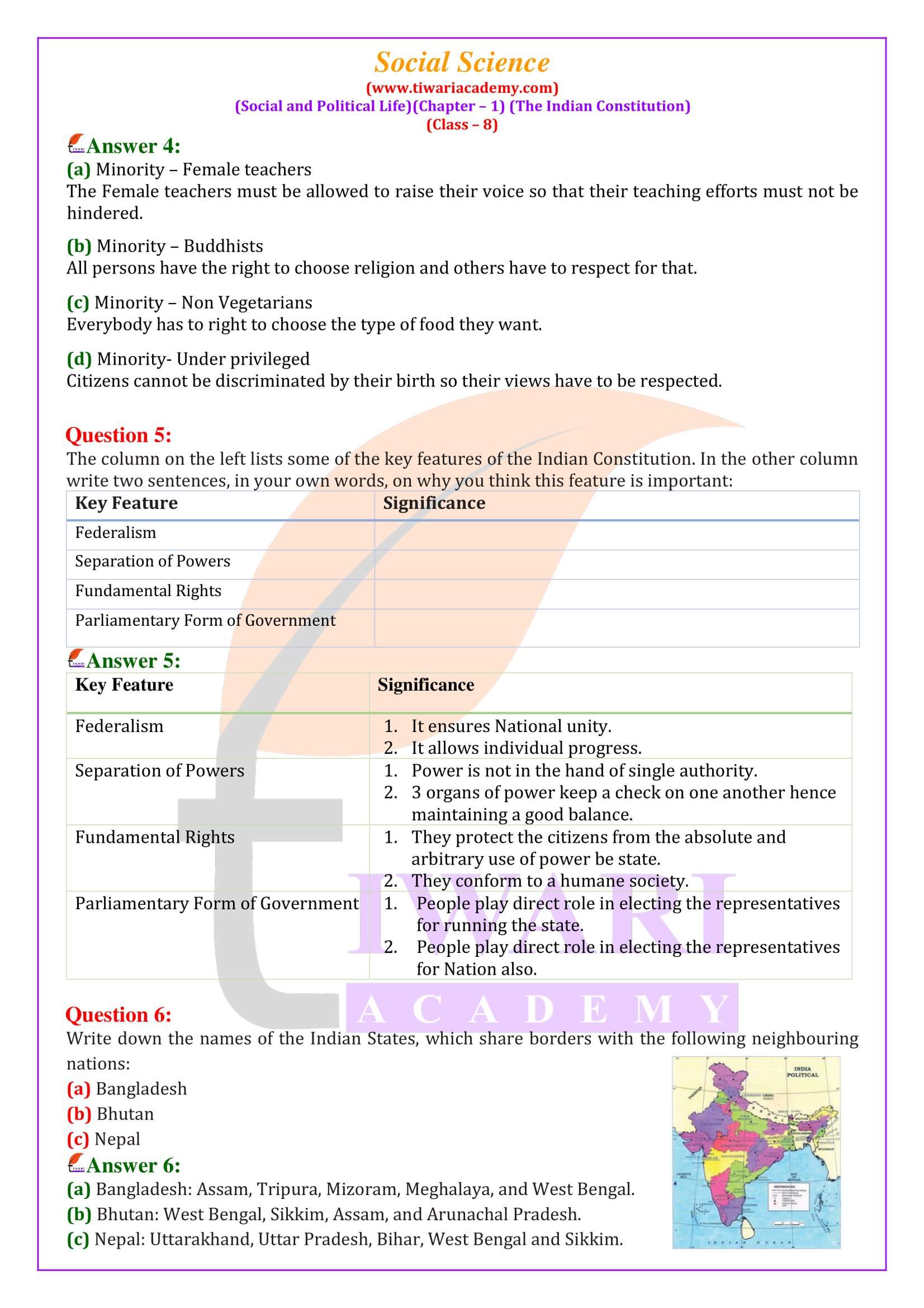NCERT Solutions for Class 8 Social Science Civics Chapter 1 The Indian Constitution in Hindi and English Medium (Unit 1 of Social and Political Life – III ) updated for the academic session 2025-26. Class VII Political Science Chapter 1 Solutions are revised and modified according to rationalised NCERT book issued for 2025-26 exams.
NCERT Solutions for Class 8 Social Science Civics Chapter 1
| Class: | 8 |
| Subject: | Social Science – Civics |
| Chapter 1: | The Indian Constitution |
| Academic Session: | 2025-26 |
Class 8 Civics Chapter 1 Question Answers
CBSE NCERT Solutions for Class 8 Social Science Civics Chapter 1 The Indian Constitution in English Medium is given below to free download. All the solutions and offline apps are updated for new academic session 2025-26. Download these solutions for offline use or use as it is without downloading online.
Extra Questions on 8th Civics Chapter 1
What is meant by Federalism?
Federalism refers to the existence of more than one level of government in the country. In India, we have governments at the state level and at the centre. Panchayati Raj is the third tier of government.
What is Parliamentary Form of Government?
Parliamentary Form of Government: The different tiers of government that you just read about consist of representatives who are elected by the people.
How is Separation of Powers done ?
Separation of Powers: According to the Constitution, there are three organs of government. These are the legislature, the executive and the judiciary. The legislature refers to our elected representatives.
Describe the Fundamental Rights?
Fundamental Rights: The section on Fundamental Rights has often been referred to as the ‘conscience’ of the Indian Constitution. Fundamental Rights protect citizens against the arbitrary and absolute exercise of power by the State. The Constitution, thus, guarantees the rights of individuals against the State as well as against other individuals.
What do you understand by Secularism?
Secularism: A secular state is one in which the state does not officially promote any one religion as the state religion.
Important Notes on 8th Civics Chapter 1
Between December 1946 and November 1949, the Constituent Assembly drafted a constitution for independent India. Constituent Assembly approached this task with the great idealism that the freedom struggle had helped produce.
A Constitution helps serve as a set of rules and principles that all persons in a country can agree upon as the basis of the way in which they want the country to be governed. This includes not only the type of government but also an agreement on certain ideals that they all believe the country should uphold.
1. The country of Nepal has witnessed several people’s struggles for democracy.
In October 2002, King Gyanendra, citing the Maoist uprising in the countryside as his reason, began taking over different aspects of the government with the army’s assistance.
2. The King then finally took over as the head of government in February 2005.
3. In November 2005, the Maoists joined other political parties to sign a 12-point agreement. In 2006, this people’s movement for democracy began gaining immense force.
4. It repeatedly refused the small concessions that the King made and finally in April 2006 the King restored the Third Parliament and asked the political parties to form a government.
5. In 2007, Nepal adopted an interim Constitution. The above photos show scenes from the people’s movement for democracy in 2006.
Important Questions on 8th Civics Chapter 1
Why does a democratic country need a Constitution?
In a democratic country, the people from every society irrespective of their social, religious, economic and cultural background have a direct role in electing their representatives who form the government. A democratic country need a constitution since it plays a crucial role in many aspects like – It lays out the important guidelines that govern decision making within the various societies of the country. It lays down the ideals that form the basis of the kind of country that its citizens aspire to live in. It serves as asset of rules and principles as the basis by which the country has to be governed. It provides rules to safeguard the interests of minorities and prevent any kind of domination by the majority on minorities. It lays down rules that guard against the misuse of power by any politician leader. It also provides rights to its citizens and protects their freedom.
What would happen if there were no restrictions on the power of elected representatives?
In democracy people choose their leaders so that they can exercise power responsibly on their behalf. But there is always the possibility that these leaders might misuse their authority as per their wish which cannot be allowed in democracy. This misuse of authority can result in gross injustice and breakdown of democratic system. Hence as a safeguard against the misuse of power by our political leaders it is necessary to have restriction on their power.
Identify the minority with reason: In a school with 30 teachers, 20 of them are male.
Minority – Female teachers The Female teachers must be allowed to raise their voice so that their teaching efforts must not be hindered.
Identify the minority with reason: In a city, 5 per cent of the population are Buddhists.
Minority – Buddhists All persons have the right to choose religion and others have to respect for that.
Identify the minority with reason: In a factory mess for all employees, 80 per cent are vegetarians.
Minority – Non Vegetarians Everybody has to right to choose the type of food they want.
Identify the minority with reason: In a class of 50 students, 40 belong to more well-off families.
Minority- Under privileged Citizens cannot be discriminated by their birth so their views have to be respected.





